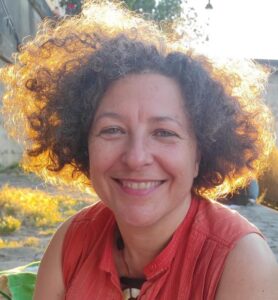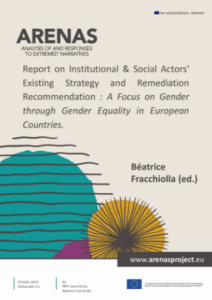 Beatrice Fracchiolla of the University of Lorraine in France leads ARENAS Work Package 5 (WP5) Mediations and Remedies for Extremist Narratives. Here she outlines the aims of the Work Package and the work she and her team have done on their first project deliverable, D5.1 Report on Institutional & Social Actors’ Existing Strategy and Remediation Recommendation: A Focus on Gender through Gender Equality in European Countries. A draft version of this deliverable is available to download on the ARENAS website; the final version will be uploaded once approved by the EC.
Beatrice Fracchiolla of the University of Lorraine in France leads ARENAS Work Package 5 (WP5) Mediations and Remedies for Extremist Narratives. Here she outlines the aims of the Work Package and the work she and her team have done on their first project deliverable, D5.1 Report on Institutional & Social Actors’ Existing Strategy and Remediation Recommendation: A Focus on Gender through Gender Equality in European Countries. A draft version of this deliverable is available to download on the ARENAS website; the final version will be uploaded once approved by the EC.
The aim of WP5 is to:
- Analyse the existing strategies employed by social and institutional actors in response to extreme speech narratives
- Develop a cross-country comparison of the different legal systems within the consortium (including parallel analyses from other projects), and identify shared legal traditions, rules, and principles (i.e., a common core) regulating extreme narratives, with particular attention to cases involving discourses with discriminatory effects
- Raise awareness by creating preventive and (re)mediation measures concerning otherness and tolerance, in collaboration with social actors
- Propose recommendations to policymakers and civil society for countering extremist narratives
For these reasons, the aim of our first deliverable, entitled D5.1, was to offer preliminary insights into the identification and analysis of existing strategies employed by social actors across all EU countries participating in the project, over the past ten years. We chose to focus on achieving sex and gender equality, as the nation is based on both sexes and the roles they assume in society, which should be equal. This implies that gender should not, in fact, constitute an issue at all, given that citizens are equal individuals.
 We worked as a small group within WP5 itself, collecting as much information as possible on laws, practices, and historical developments that have shaped societal representations over time in each country. In some cases, we were able to organise specific research seminars, which enabled us to examine more deeply the dynamics linking nation, gender, and science—alongside education more broadly.
We worked as a small group within WP5 itself, collecting as much information as possible on laws, practices, and historical developments that have shaped societal representations over time in each country. In some cases, we were able to organise specific research seminars, which enabled us to examine more deeply the dynamics linking nation, gender, and science—alongside education more broadly.
The convergent and intrinsic connections that integrate and positively bind these three terms in any healthy social construction indeed constitute—as demonstrated in recent months by the actions of United States President Donald Trump, who has undermined them—the foundations of a balanced, prosperous, and fulfilling society in which everyone has their rightful place. This is precisely the vision Europe aspires to.
Accordingly, we have developed more extensive and annotated sections concerning France, Ireland, Latvia, Finland, Italy, and Spain.
The objective is to be able to provide comprehensive recommendations in terms of discursive strategies, in order to maintain or establish the always-fragile balance between these three concepts, beginning with equality between women and men. This is the cornerstone of all other aspects, for if such equality is upheld consistently and absolutely, then the remainder—science, education, and a nation respectful of all individual citizens—will follow, through an ethical and impartial approach.
To this end, we undertook an analysis of institutional documents produced by educational institutions from nursery level through to secondary school (including ministries, etc.), and by governments, focusing on how discrimination—defined according to EU standards—is narrated. We first compiled and catalogued the strategies of resistance employed by social actors (M1–12). We then examined representations within the major themes of extremist narratives and identified different types of discourse by analysing institutional educational materials and legislation from the past ten years.
Our second step is to measure these strategies objectively by assessing their performativity and evaluating their levels of effectiveness (M12–24). Our findings will be further enriched by the end of the project, thanks to the other tasks we are conducting concerning education. The active involvement of academic institutions such as the University of Genoa, the University of Lorraine, Aix-Marseille University, the University of Helsinki, along with non-academic partners—particularly Creatives Ideas, Momentum, and UniTrento—has proven to be of great value to us.
